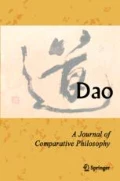Abstract
Mèngzǐ’s 孟子 advice to King Xuān 宣 to take up his feeling of compassion for an ox and apply it to his people (Mèngzǐ 1A7) is equivocal, and can be understood in two markedly different ways: on one hand, to take immediate care of the people’s needs by performing a kind of (mental) act of applying compassion; on the other hand, to engage in a long-term project of cultivating compassion for them. These views, moreover, when combined with the assumption that emotion is the sole motivator of moral action, give us a perplexing picture of Mèngzǐ as urging the king to do exactly what he cannot—namely, acting out of compassion for his people that he falls short of feeling enough of. This essay explicates the Mengzian model of moral extension (tuī 推) through a solution to this puzzle, specifically by explaining how one’s immediate performance of moral actions are conducive to cultivating related moral emotions.
Similar content being viewed by others
References
Barrett, Lisa F., Kevin N. Ochsner, and James J. Gross. 2007. “On the Automaticity of Emotion.” In Social Psychology and the Unconscious: The Automaticity of Higher Mental Processes, edited by John A. Bargh. New York: Psychology Press.
Blackburn, Simon. 1998. Ruling Passions: A Theory of Practical Reasoning. Oxford: Oxford University Press.
Fraser, Chris. 2011. “Mohism and Motivation.” In Ethics in Early China: An Anthology, edited by Chris Fraser, Dan Robins, and Timothy O’Leary. Hong Kong: Hong Kong University Press.
Galdi, Silvia, Bertram Gawronski, Luciano Arcuri, and Malte Friese. 2012. “Selective Exposure in Decided and Undecided Individuals: Differential Relations to Automatic Associations and Conscious Beliefs.” Personality and Social Psychology Bulletin 38: 559–569.
Gawronski, Bertram, and Galen V. Bodenhausen. 2006. “Associative and Propositional Processes in Evaluation: An Integrative Review of Implicit and Explicit Attitude Change.” Psychological Bulletin 132.5: 692–731.
______. 2014. “Implicit and Explicit Evaluation: A Brief Review of the Associative–Propositional Evaluation Model.” Social and Personality Psychology Compass 8.8: 448–462.
Graham, Angus C. 2002. “The Background of the Mencian [Mengzian] Theory of Human Nature.” In Essays on the Moral Philosophy of Mengzi, edited by Xiusheng Liu and Philip J. Ivanhoe. Indianapolis: Hackett Publishing Co.
Griffiths, Paul. 1997. What Emotions Really Are: The Problem of Psychological Categories. Chicago, IL: University of Chicago Press.
Hu, Jing. 2019. “Part 1: Moral Motivation in Mencius—When a Child Falls into a Well.” Philosophy Compass 14.8: e12615. https://doi.org/10.1111/phc3.12615.
Im, Manyul. 1999. “Emotional Control and Virtue in the Mencius.” Philosophy East and West 49.1: 1–27.
Kim, Myeong-seok. 2010. “What Cèyǐn zhī xīn (Compassion/Familial Affection) Really Is.” Dao: A Journal of Comparative Philosophy 9.4: 407–425.
______. 2014. “Respect in Mèngzǐ as a Concern-based Construal—How It Is Different from Desire and Behavioral Disposition.” Dao: A Journal of Comparative Philosophy 13.2: 231–250.
______. 2018. “Emotion and Judgment: Two Sources of Moral Motivation in Mèngzǐ.” Dao: A Journal of Comparative Philosophy 17.1: 51–80.
______. 2021. “Reason and Moral Motivation in Mòzǐ.” Dao: A Journal of Comparative Philosophy 20.2: 179–205.
______. Forthcoming. “Mencius on Moral Psychology.” In Dao Companion to Mencius, edited by Yang Xiao. Heidelberg: Springer.
Knoblock, John, and Jeffrey Riegel. 2013. Mozi: A Study and Translation of the Ethical and Political Writings. Berkeley: Institute of East Asian Studies, University of California at Berkeley.
McRae, Emily. 2011. “The Cultivation of Moral Feelings and Mengzi’s Method of Extension.” Philosophy East and West 61.4: 587–608.
Nivison, David S. 1996. “Motivation and Moral Action in Mencius.” In The Ways of Confucianism: Investigations in Chinese Philosophy, edited by Bryan Van Norden. Chicago: Open Court.
Roberts, Robert. 1988. “What an Emotion Is: A Sketch.” The Philosophical Review 97.2: 183–209.
Roberts, Robert, and W. Jay Wood. 2007. Intellectual Virtues: An Essay in Regulative Epistemology. Oxford: Oxford University Press.
Shun, Kwong-loi. 1997. Mencius and Early Chinese Thought. Stanford: Stanford University Press.
Smith, Eliot R. 1996. “What Do Connectionism and Social Psychology Offer Each Other?” Journal of Personality and Social Psychology 70: 893–912.
Sūn, Yíràng 孫詒讓. 2001. Commentaries on the Mozi 墨子閒詁. Běijīng 北京: Zhōnghuá Shūjú 中華書局.
Van Norden, Bryan W. 1991. “Kwong-Loi Shun on Moral Reasons in Mencius.” Journal of Chinese Philosophy 18.4: 353–370.
Wilson-Mendenhall, Christine D., and Lawrence W. Barsalou. 2016. “A Fundamental Role for Conceptual Processing in Emotion.” In Handbook of Emotions, edited by Lisa F. Barrett, Michael Lewis, and Jeannette M. Haviland-Jones. 4th ed. New York: Guilford Press.
Wong, David. 2002. “Reasons and Analogical Reasoning in Mengzi.” In Essays on the Moral Philosophy of Mengzi, edited by Xiusheng Liu and Philip J. Ivanhoe. Indianapolis: Hackett Publishing Co.
______. 2015. “Growing Virtue: The Theory and Science of Developing Compassion from a Mencian Perspective.” In The Philosophical Challenge from China, edited by Brian Bruya. Cambridge, MA: The MIT Press.
Acknowledgments
I am deeply grateful to Philip J. Ivanhoe, Winnie Sung, Hagop Sarkissian, Jacklyn Cleofas, Jihyun Hwang, and the anonymous reviewers of this essay for their inspiring comments, suggestions, and references.
Author information
Authors and Affiliations
Corresponding author
Additional information
Publisher’s Note
Springer Nature remains neutral with regard to jurisdictional claims in published maps and institutional affiliations.
Rights and permissions
About this article
Cite this article
KIM, MS. Moral Extension and Emotional Cultivation in Mèngzǐ. Dao 21, 369–388 (2022). https://doi.org/10.1007/s11712-022-09838-8
Accepted:
Published:
Issue Date:
DOI: https://doi.org/10.1007/s11712-022-09838-8




